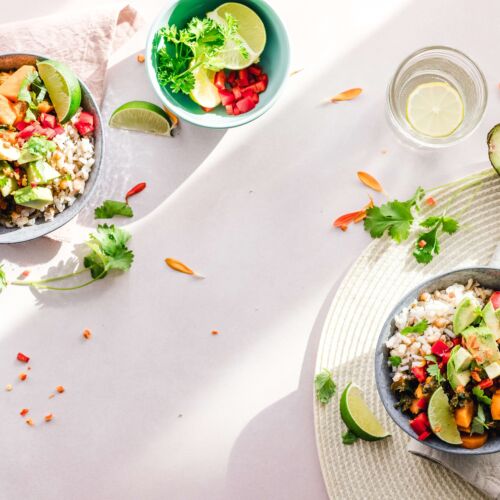Introduction to the 10 Principles of Intuitive Eating
by Dawid Furman

Have you ever gone on a diet that didn’t work? You’re not alone. A majority of people have had the same frustrating experience.
Evelyn Tribole RD and Elyse Resch RD also noticed this and managed to use research to support that ultimately our relationship with food is what needs to be healed for optimal health.
In their book published in 1995, Intuitive Eating: A Revolutionary Program That Works, they outline 10 principles to ditch dieting for good and to embrace more health and well-being.
In brief, intuitive eating is paying attention to and using our inner knowing to guide us in meeting our nutritional needs.
It believes that only you are in charge of your feelings and thoughts, and only you can tell how hungry you are, as opposed to any diet out there.
It may surprise you that this isn’t just some new trend but is based on substantial research over the past forty years.
Intuitive Eating has many psychological and physical health benefits, such as increased well-being and lower risk of eating disorders, as well as reduced blood pressure, cholesterol levels, and other inflammation markers such as blood glucose levels.
In the Intuitive Eating Workbook, Tribole and Resch break down the 10 principles of intuitive eating into actionable steps in order to help restore our body’s intuitive knowledge of knowing how to nourish itself.
Follow on reading for a better insight into the 10 principles of intuitive eating:
- Ditch the Diet Mentality
Are you holding on to the hope that diets still work?
In the long run, research shows diets not only don’t work for weight loss but also can cause weight gain due to numerous metabolic factors.
According to Tribole and Resch, diets can have a negative impact on your psychology as well as cause eating disorders as they do not cater to your hunger and eating preferences, as opposed to intuitive eating.
In order to ditch the diet mentality, it is important to have self-compassion and use tools to ditch dieting and dieting language.
Learn more to ditch the diet mentality here.
2. Know your Hunger
Did you grow up in a home where you had to finish your plate regardless of how hungry you were?
Hunger is a natural cue that tells us that our bodies need to be nourished properly. A baby knows exactly how much breast milk to drink to grow properly based on their intuitive signals and as we grow up external signals, like being told to finish everything on your plate as a child, take over from the body’s intuition.
It is important to be aware of physical hunger cues such as increased heart rate and a growly stomach, brain fog, and being hangry, to know when to provide our body with energy. Otherwise, we can reach a state of excessive hunger, which leads to overeating.
Get to know your hunger by identifying various signs of hunger, such as mood and energy change, as well as rating the physical sensation from your stomach and by rating it between 1 and 10.
Practice self-care to get rid of disruptions such as stress which may make you miss your hunger cues.
Read about 5 tips to know your hunger here.
3. Make Peace with Food
You know the saying, “Give peas a chance”? Or is it, “ll we need is kale, kale is all we need”? Nope, it’s “To beet or not to beet? That is the question.”
All joking aside, have you ever denied yourself from having something does it make you want to have it more, such as a new top from the store or the turkey dinner like in the case of Chloe the cat?
Not allowing yourself to eat a certain food can lead to obsessive thinking and overeating.
It is important to make peace with food, as when you allow yourself a certain food without deprivation, it will stop uncontrollable cravings that lead to overeating.
When you feel you are ready to make peace with food, it is important to do so in a safe environment at a pace that is comfortable to you, taking one step at a time.
According to Lindsey Mcgregor RD, this is by far “the most vulnerable step I see my clients take,” and “having the support of a dietitian can really help”.
With practice (and maybe with the support of a guiding hand of a dietitian), you will soon realize if you legalize your favourite food, you will not feel the urgency of eating more, and you won’t feel that you will never stop eating it.
Read about 5 tips that can help you make peace with food here.
4. Challenge The Food Police
Have you ever beat yourself up about the choices about eating you have made?
There are many negative beliefs out there about food created by the so-called “food police”, that can have a negative effect on our thoughts and create a sense of guilt.
It is important to find out where these thoughts come from and challenge them, as our thoughts can affect behaviours.
Silencing the thoughts of the food police is a vital part of intuitive eating, as it can stop our war with food and make it an enjoyable experience.
If thoughts are approached using a non-judgemental approach and are reframed, well-being can be greatly improved as well as your quality of life.
To learn 5 tips on how to challenge the food police, read more here.
5. Feel your Fullness
Pay attention to hunger signals sent from your body as well as pausing in between meals to check on how full you are.
It is important to not have any distractions such as phones when eating to be truly able to feel your physical sensations of fullness.
As you gain more experience with fullness, for example, rating your fullness between 1-10, and aiming to stop at 7 where you will be able to identify the last bite threshold, which is the last bite before you reach a comfortable level of satiety and will stop eating.
To learn 5 tips about how to feel your fullness read more here.
6. Discover the Satisfaction Factor
Have you ever struggled to eat a food you don’t like just because you thought it might help you lose weight?
Due to the large emphasis people put on being thin, they often consume foods that do not satisfy them, which leads them to crave the satisfying factor even when not hungry.
Learning to appreciate food and getting enjoyment from it with the intention of feeling good will stop you from trying to hunt in the fridge after having an unsatisfying snack and make you feel more satisfied with life in general.
Respect your taste by asking yourself what food you really want to consume by taking into account sensory considerations of food such as taste, texture, smell, and appearance.
It is important to eat slowly and mindfully in order to stay present and experience the many sensations of eating, which will make it much easier for you to tell when you’ve had enough.
Check out 4 tips on how to discover the satisfaction factor of food here.
7. Cope with your feeling without using food
Have you ever had a bad day and just wanted to stuff yourself with food to cheer up?
Due to the celebrating nature of food in many cultures, food is often linked with emotions, and you may use food as a tool to try to cope with your emotions.
Emotional eating is often perpetuated by a lack of self-care, such as lack of sleep or stress, so adequate self-care is vital to stop emotional eating.
Pay attention to emotions that trigger emotional eating and take time out to ask yourself, how are you really feeling, or are you really hungry?
Find other distractions to help cope with your emotions instead of food, such as watching a movie, taking a walk, or talking to a friend.
Check out 5 tips on how to cope with your feelings without using food here.
8. Respect your body
It is important to treat your body with kindness and respect as we all come in different shapes and sizes, despite what’s common in the media.
Everyone is born with a genetic blueprint that your body is made to maintain, despite what any diet out there may tell you.
If you start living without body negativity, you will finally feel free to and be able to focus on anything you set out to achieve.
There are numerous ways to show your body respect, such as showing gratitude, practicing self-care, getting rid of the scale, stopping body checking, donating old clothes that remind you of dieting and buying new comfortable clothes, and lastly, stopping the comparison of yourself to others.
Check out 5 tips on how to respect and accept your body here.
9. Exercise: Feel the Difference
Have you ever done an exercise you don’t like because you heard it’s the best way to lose weight?
Choose exercises you enjoy instead of the ones that will make you burn more calories, as long as you exercise for unrealistic weight loss instead of for pleasure, you will likely be disappointed in yourself.
There are many benefits of exercise other than weight loss, such as a lower risk of many chronic diseases as well as improved quality of life.
Start small by sitting less and slowly incorporate physical activity into your life that you enjoy, even if it’s only brisk walking which also counts as exercise.
Deriving pleasure from physical activity, such as getting more energy, will give you more motivation to repeat the activity to feel good again.
Listen and pay attention to how your body feels before and after moving to find activities you derive pleasure from.
Check out 5 tips on how to find exercises you enjoy here.
10. Honour Your Health: Gentle Nutrition
Lastly, are you wondering what types of food you should be eating under the intuitive eating principles?
Choose foods that not only your taste buds like but also nourishing foods which will make you feel good. This will even further increase your satisfaction with the food.
It is important to value what your taste buds say, however, this is not your only consideration anymore, as how the food fuels you is as important.
You can still consume high-energy treats such as chocolate from time to time because it’s what you eat consistently over time that counts.
Remember, the process does not have to be perfect, sometimes you may, for different reasons, have to eat what’s available. However, the important thing is to remember that you still have many meals ahead of you.
Click here for 5 tips on gentle nutrition.
It might seem like a lot of information, and it might seem like a mountain to climb from “ diet rock bottom,” but think of it more as a hill to begin with, especially by breaking down the steps and not trying to conquer all ten at once.
The help of a Registered Dietitian can provide clarity, support, and accountability along the way. Some Dietitians have noticed that the timeline to restore a person’s relationship with food which can last a lifetime, can start at about one year after starting working towards it.
Find a qualified Intuitive Eating Dietitian on Dietitian Directory.
About the Author: Dawid Furman is a nutrition and exercise science student studying at the South East Technological University in Ireland and hopes to pursue a career as a dietitian in the future.
Reviewed by: Lindsey McGregor, RD
Images from Unsplash and Pexels
The Site is not intended to be a substitute for professional advice. Under no circumstances will we be liable for any loss or damage caused by your reliance on information obtained through the Site. You are responsible for evaluating the accuracy, completeness, or usefulness of any information, opinion, advice or other content available through the Site. Please seek the advice of professionals, as appropriate, regarding the evaluation of any specific information, opinion, advice or other content. Never disregard professional advice, including medical advice, or delay in seeking it, because of something you have read on this Site.



